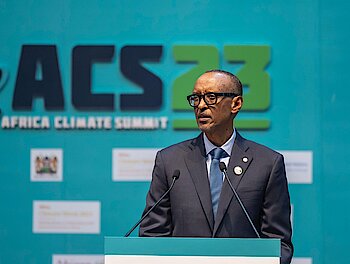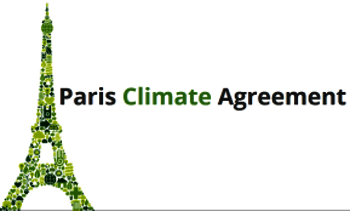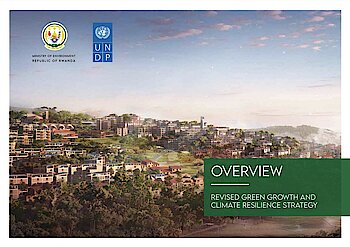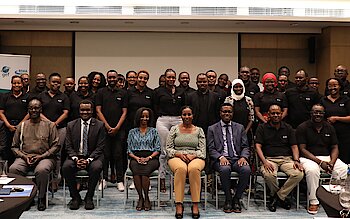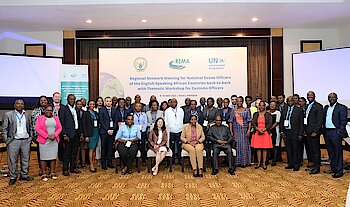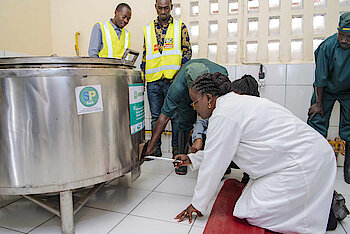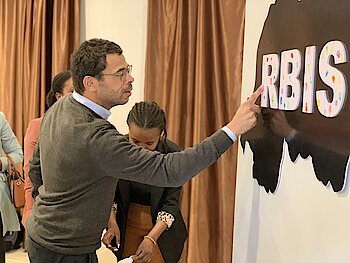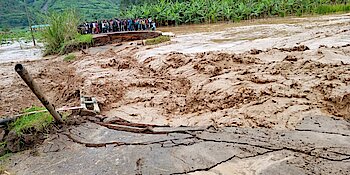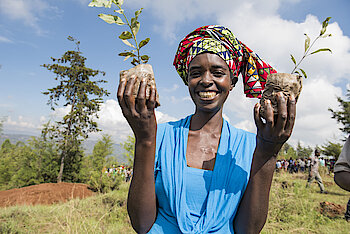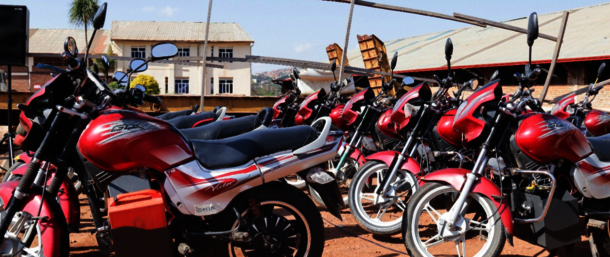
Retrofit Electric Motorcycles Project; Another step towards emission reduction
The Greenhouse gases emission inventory report of 2015 indicated that the vehicles (that burns the fossil fuel) emit emissions at 13% of the total national emissions. In 2018, the number of registered motorcycles were 112,404. This implies how much emissions generated from vehicles contribute more emissions on national total emissions. without mitigation intervention (it is referred as Business as usual) it is expected to grow.
Rwanda has pledged to cut emissions at 38% by 2030, in which electric mobility is one of the key climate actions to reach that end. In that regard, on June 09, 2021 Kigali, the Rwanda Environment Management Authority (REMA) partnered with a private local company, Rwanda Electric Mobility (REM Ltd) and jointly launched a Retrofit Electric Motorcycles Project as a pilot phase in the city of Kigali, with the financial and technical support from UNDP Rwanda through the Poverty Environment Action for SDGs (PEA) Project.
This comes after the Government of Rwanda has established the incentives for supporting the easy transition to the e-mobility.
As part of effort in emission reduction, this project aim to accelerate the transition from petrol-fuelled motors, which accounts from more than 80% of the total motorcycles in Rwanda, to electric ones.
Donald Rukotana Kabanda, the CEO REM Ltd explained that retrofit e-motors will generate more economic benefits than conventional ones. “The retrofitted e-motors are equipped with two batteries, which may be also portable. One full charge costs Rwf 900 and covers 50km of a trip while one litre of petrol costs more than Rwf 1000 and covers 25km. This means that a retrofit e-motor-taxi operator will save more than Rwf 100 per charge compared to petrol-fuelled motor-taxi,” Kabanda elucidates.
This retrofitting is planned in a period of six-month pilot phase, 80 motorcycles will be retrofitted. Thereafter, retrofitting services will be available to motorcycle owners across capital Kigali on a relatively affordable cost
From this project and other in pipelines, we can rest assured that the target set in Nationally Determined Contributions are feasible and can be achieved. Slowly but surely more and more this will also help to achieve Rwanda’s target to become a carbon neutral economy by 2050.
Topics
More posts
Africa Climate Summit | National Statement by President Kagame | Nairobi, 5 September 2023
First, I wish to thank President Ruto for hosting us in beautiful and vibrant Nairobi for the Africa Climate Summit, organized in collaboration with…
Strengthening Transparency in Climate Action: Rwanda's Progress under the Enhanced Transparency Framework
Climate change is a global challenge that requires urgent action. Rwanda, like many other countries, is experiencing the impacts of climate change,…
RWANDA LAUNCHES REVISED GREEN GROWTH AND CLIMATE RESILIENCE STRATEGY
Rwanda has on June 5, 2023 launched the Revised Green Growth and Climate Resilience Strategy as part of World Environment Day celebrations. The…
REMA LAUNCHES THE EVIDENCE-BASED CLIMATE REPORTING INITIATIVE TO ADVANCE CLIMATE RESEARCH AND REPORTING
The Rwanda Environment Management Authority (REMA) in collaboration with the African Institute of Mathematical Sciences (AIMS) have on May 19, 2023…
NATIONAL OZONE OFFICERS MEET IN KIGALI TO DISCUSS THE IMPLEMENTATION OF MONTREAL PROTOCOL AND ITS KIGALI AMENDMENT
The Rwanda Environment Management Authority (REMA) in collaboration with the United Nations Environment Programme (UNEP)’s OzonAction has organized a…
REMA OFFICIALLY LAUNCHES THE LPGS DONATED TO 20 SCHOOLS IN GREEN AMAYAGA PROJECT INTERVENTION AREA
The Minister of Environment, Dr. Jeanne d’Arc Mujawamariya has on 3rd May 2023 launched the use of Liquefied Petroleum Gas (LPG) for bulk cooking in…
The Rwanda Biodiversity Information System to Drive Climate Change Adaptation and Conservation was launched
The Center of Excellence in Biodiversity and Natural Resource Management at the University of Rwanda has launched the Rwanda Biodiversity Information…
Essential things to know about the loss and damage due to climate change
The evidence of both global and local climate change impact is beyond dispute. There are clear effects of climate change occurring all across the…
Why Women’s Consideration is a Key in battling climate change impacts?
The livelihoods of billions of people throughout the world are highly impacted by climate change, despite efforts to reduce its hazards. This is…
